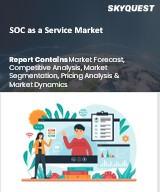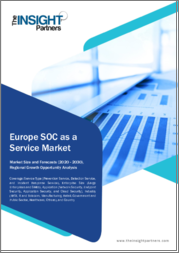
|
시장보고서
상품코드
1778903
SOCaaS(SOC-as-a-Service) 시장 - 세계 산업 규모, 점유율, 동향, 기회, 예측, 서비스 유형별, 제공 제품별, 용도별, 최종 용도별, 지역별, 경쟁별(2020-2030년)SOC as a Service Market - Global Industry Size, Share, Trends, Opportunity, and Forecast, Segmented By Service Type, By Offering, By Application, By End Use, By Region & Competition, 2020-2030F |
||||||
SOCaaS(SOC-as-a-Service) 세계 시장 규모는 2024년에 63억 1,000만 달러로 평가되었고, 2030년 CAGR은 9.97%로, 2030년에는 111억 6,000만 달러에 이를 것으로 예측됩니다.
SOCaaS(SOC-as-a-Service) 세계 시장은 클라우드 기반 플랫폼을 통해 보안 모니터링, 위협 감지, 사고 대응, 위험 관리 서비스를 아웃소싱하는 시장을 말합니다. 기업은 사내에 SOC 인프라를 구축하는 대신 숙련된 분석가, 자동화 도구, 실시간 모니터링에 기반한 고급 사이버 보안 운영을 제공하는 제3자 제공업체를 활용합니다. 이러한 서비스에는 일반적으로 위협 인텔리전스, 취약점 관리, 컴플라이언스 보고서, 사전 예방적 보안 대응 등이 포함되기 때문에 많은 자본 투자 없이도 24시간 365일 보호가 필요한 기업에게 매우 가치 있는 서비스입니다.
| 시장 개요 | |
|---|---|
| 예측 기간 | 2026-2030년 |
| 시장 규모 : 2024년 | 63억 1,000만 달러 |
| 시장 규모 : 2030년 | 111억 6,000만 달러 |
| CAGR : 2025-2030년 | 9.97% |
| 급성장 부문 | 은행/금융서비스/보험(BFSI) |
| 최대 시장 | 북미 |
랜섬웨어, 피싱, 지능형 지속위협 등 지속적인 경계가 필요한 사이버 위협의 고도화로 인해 시장은 꾸준히 확대되고 있습니다. 사이버 보안 전문 팀이 없는 중소기업의 경우, SOCaaS(SOC-as-a-Service)는 위험을 줄이고 규제 준수를 달성할 수 있는 효과적인 솔루션입니다. 또한, 원격 근무, 클라우드 도입, 디지털 전환 증가 추세는 조직의 공격 대상 영역을 확장하고 확장성, 신속한 배포, 전문가 지원을 제공하는 아웃소싱 SOC 서비스에 대한 수요를 더욱 촉진하고 있습니다.
이 시장은 보안 서비스의 인공지능, 머신러닝, 자동화의 발전으로 인해 가속적인 성장이 예상되고 있습니다. 이러한 기술을 통해 서비스 제공업체는 보다 능동적이고 예측적인 보안 기능을 제공할 수 있으며, 위협 감지 정확도와 대응 시간을 향상시킬 수 있습니다. 또한, 전 세계적으로 데이터 보호 및 사이버 보안에 대한 규제 프레임워크가 강화됨에 따라, 기업들은 컴플라이언스 요건을 효율적으로 충족하기 위해 SOCaaS(SOC-as-a-Service) 제공업체를 점점 더 많이 이용하고 있습니다. 사이버 리스크 증가, 운영 비용 절감, 기술 중심의 서비스 강화가 결합되면서 세계 SOCaaS(SOC-as-a-Service) 시장은 향후 몇 년 동안 크게 성장할 것으로 예측됩니다.
주요 시장 성장 촉진요인
사이버 위협의 고도화
주요 시장 과제
데이터 프라이버시 우려와 주권적 규제
주요 시장 동향
AI를 활용한 보안 운영 도입 확대
목차
제1장 솔루션 개요
- 시장의 정의
- 시장 범위
- 대상 시장
- 조사 대상년
- 주요 시장 세분화
제2장 조사 방법
제3장 주요 요약
제4장 고객의 소리
제5장 세계의 SOCaaS(SOC-as-a-Service) 시장 전망
- 시장 규모와 예측
- 금액별
- 시장 점유율과 예측
- 서비스 유형별(예방 서비스, 감지 서비스, 사고 대응 서비스)
- 제공 제품별(풀 매니지드, 공동 매니지드)
- 용도별(네트워크 보안, 클라우드 보안, 엔드포인트 보안, 용도 보안, 기타)
- 최종 용도별(은행/금융서비스/보험(BFSI), 헬스케어, 정부, 제조, 에너지 및 유틸리티, IT 및 통신, 운송 및 물류, 기타)
- 지역별(북미, 유럽, 남미, 중동 및 아프리카, 아시아태평양)
- 기업별(2024년)
- 시장 맵
제6장 북미의 SOCaaS(SOC-as-a-Service) 시장 전망
- 시장 규모와 예측
- 시장 점유율과 예측
- 북미 : 국가별 분석
- 미국
- 캐나다
- 멕시코
제7장 유럽의 SOCaaS(SOC-as-a-Service) 시장 전망
- 시장 규모와 예측
- 시장 점유율과 예측
- 유럽 : 국가별 분석
- 독일
- 프랑스
- 영국
- 이탈리아
- 스페인
제8장 아시아태평양의 SOCaaS(SOC-as-a-Service) 시장 전망
- 시장 규모와 예측
- 시장 점유율과 예측
- 아시아태평양 : 국가별 분석
- 중국
- 인도
- 일본
- 한국
- 호주
제9장 중동 및 아프리카의 SOCaaS(SOC-as-a-Service) 시장 전망
- 시장 규모와 예측
- 시장 점유율과 예측
- 중동 및 아프리카 : 국가별 분석
- 사우디아라비아
- 아랍에미리트(UAE)
- 남아프리카공화국
제10장 남미의 SOCaaS(SOC-as-a-Service) 시장 전망
- 시장 규모와 예측
- 시장 점유율과 예측
- 남미 : 국가별 분석
- 브라질
- 콜롬비아
- 아르헨티나
제11장 시장 역학
- 성장 촉진요인
- 과제
제12장 시장 동향과 발전
- 인수합병(M&A)
- 제품 출시
제13장 기업 개요
- IBM Corporation
- AT&T Inc.
- NTT Security Holdings Corporation
- Broadcom Inc.
- Secureworks Inc.
- Thales Group
- Verizon Communications Inc.
- Fortinet, Inc.
제14장 전략적 제안
제15장 회사 소개 및 면책조항
LSH 25.08.05The Global SOC as a Service Market was valued at USD 6.31 Billion in 2024 and is expected to reach USD 11.16 Billion by 2030 with a CAGR of 9.97% through 2030. The Global SOC as a Service market refers to the delivery of outsourced security monitoring, threat detection, incident response, and risk management services via cloud-based platforms. Instead of building in-house SOC infrastructure, organizations leverage third-party providers that offer advanced cybersecurity operations supported by skilled analysts, automated tools, and real-time monitoring. These services typically include threat intelligence, vulnerability management, compliance reporting, and proactive security responses, making them highly valuable for enterprises seeking 24/7 protection without heavy capital investment.
| Market Overview | |
|---|---|
| Forecast Period | 2026-2030 |
| Market Size 2024 | USD 6.31 Billion |
| Market Size 2030 | USD 11.16 Billion |
| CAGR 2025-2030 | 9.97% |
| Fastest Growing Segment | BFSI |
| Largest Market | North America |
The market is rising steadily due to the increasing sophistication of cyber threats, including ransomware, phishing, and advanced persistent threats, which demand continuous vigilance. Small and medium enterprises, often lacking dedicated cybersecurity teams, find SOC as a Service an effective solution for mitigating risks and achieving regulatory compliance. Additionally, the growing trend of remote work, cloud adoption, and digital transformation initiatives has expanded the attack surface for organizations, further driving demand for outsourced SOC services that offer scalability, rapid deployment, and expert support.
The market is expected to witness accelerated growth driven by advancements in artificial intelligence, machine learning, and automation within security services. These technologies enable service providers to offer more proactive and predictive security capabilities, improving threat detection accuracy and response times. Furthermore, as regulatory frameworks around data protection and cybersecurity tighten globally, organizations will increasingly turn to SOC as a Service providers to meet compliance requirements efficiently. The combination of rising cyber risks, operational cost savings, and technology-driven service enhancements positions the Global SOC as a Service market for significant expansion in the coming years.
Key Market Drivers
Rising Sophistication of Cyber Threats
The evolving landscape of cyber threats has emerged as a primary driver for the growth of the Global SOC as a Service Market. Modern cyberattacks have become highly targeted, leveraging sophisticated techniques such as polymorphic malware, advanced persistent threats, and AI-driven attacks that bypass traditional security measures. These evolving threats demand advanced security operations capable of real-time monitoring, quick detection, and immediate response. SOC as a Service providers are equipped with advanced threat intelligence platforms and skilled analysts, offering clients enhanced protection against attacks that could result in financial losses, data breaches, and operational disruptions.
The increasing integration of cloud services, IoT devices, and remote work environments has expanded the attack surface for organizations worldwide. With cybercriminals exploiting these vulnerabilities, enterprises are turning to outsourced SOC services to gain continuous threat visibility and timely responses without the burden of building expensive in-house infrastructure. As cyberattacks grow in frequency and complexity, SOC as a Service stands out as a strategic investment to ensure business continuity and safeguard digital assets. In 2024, the European Union Agency for Cybersecurity (ENISA) reported that 77% of organizations globally encountered targeted cyberattacks, most requiring advanced threat detection and immediate response. This emphasizes the urgent business need for SOC as a Service providers that deliver real-time monitoring, expert analysis, and rapid incident management to counter evolving and persistent threats.
Key Market Challenges
Data Privacy Concerns and Sovereignty Regulations
One of the most pressing challenges faced by the Global SOC as a Service Market is the growing concern over data privacy and data sovereignty regulations. As SOC as a Service operates on a model that often involves cloud-based monitoring and remote data analysis, sensitive organizational and customer information is frequently transferred, stored, or processed by third-party providers. This raises significant apprehensions among businesses, especially in sectors such as finance, healthcare, and government, where compliance with strict data protection laws is mandatory. Various countries and regions have implemented stringent data localization laws requiring that data generated within their jurisdiction remains stored and processed locally. The European Union's General Data Protection Regulation (GDPR), China's Cybersecurity Law, and India's Data Protection Bill are prime examples of regulations that impose complex requirements on data handling. These laws make multinational SOC as a Service operations complicated, potentially requiring service providers to establish localized data centers or partner with regional entities-steps that increase operational costs and reduce the economies of scale that make SOC as a Service attractive.
Clients are increasingly demanding transparency and accountability regarding how their data is accessed, monitored, and stored by SOC as a Service providers. The fear of unauthorized access, data misuse, or breaches involving third-party vendors creates a trust barrier that may slow down adoption rates, particularly among risk-averse organizations. Service providers must navigate varying regulatory landscapes, customize service delivery models for different jurisdictions, and invest heavily in compliance measures, legal frameworks, and client trust-building activities. This ongoing complexity places both operational and financial pressures on SOC as a Service vendors, making regulatory compliance and data sovereignty an enduring challenge. As regulations continue to evolve, providers must remain agile, which can divert focus from core threat monitoring capabilities and impact profitability in the long term.
Key Market Trends
Increasing Adoption of AI-Driven Security Operations
The integration of artificial intelligence into SOC as a Service platforms has emerged as a transformative trend, reshaping the way organizations approach security operations. AI-driven tools enhance the efficiency and accuracy of threat detection, enabling SOC providers to analyze vast datasets in real time and identify potential risks faster than human analysts alone. Machine learning algorithms allow systems to learn from historical threats, adapt to evolving attack patterns, and offer predictive insights that bolster proactive defense strategies. This not only improves the effectiveness of security operations but also reduces the response time to critical incidents, making AI a pivotal factor in the growing relevance of SOC as a Service.
AI-driven automation within SOC services streamlines routine security tasks, such as log analysis, anomaly detection, and alert triaging, freeing security analysts to focus on more complex investigations. Automated workflows facilitate quicker threat containment and remediation actions, ensuring that organizations can respond swiftly to breaches without manual delays. As cyberattacks become more sophisticated, the use of AI and machine learning in SOC as a Service is expected to rise steadily, driving innovation in service delivery models. Providers that effectively integrate AI into their operations are likely to achieve a competitive advantage, offering clients enhanced protection and operational efficiency.
Key Market Players
- IBM Corporation
- AT&T Inc.
- NTT Security Holdings Corporation
- Broadcom Inc.
- Secureworks Inc.
- Thales Group
- Verizon Communications Inc.
- Fortinet, Inc.
Report Scope:
In this report, the Global SOC as a Service Market has been segmented into the following categories, in addition to the industry trends which have also been detailed below:
SOC as a Service Market, By Service Type:
- Prevention Services
- Detection Services
- Incident Response Services
SOC as a Service Market, By Offering:
- Fully Managed
- Co-managed
SOC as a Service Market, By Application:
- Network Security
- Cloud Security
- Endpoint Security
- Application Security
- Others
SOC as a Service Market, By End Use:
- BFSI
- Healthcare
- Government
- Manufacturing
- Energy & Utilities
- IT & Telecom
- Transportation & Logistics
- Others
SOC as a Service Market, By Region:
- North America
- United States
- Canada
- Mexico
- Europe
- Germany
- France
- United Kingdom
- Italy
- Spain
- Asia Pacific
- China
- India
- Japan
- South Korea
- Australia
- Middle East & Africa
- Saudi Arabia
- UAE
- South Africa
- South America
- Brazil
- Colombia
- Argentina
Competitive Landscape
Company Profiles: Detailed analysis of the major companies present in the Global SOC as a Service Market.
Available Customizations:
Global SOC as a Service Market report with the given market data, Tech Sci Research offers customizations according to a company's specific needs. The following customization options are available for the report:
Company Information
- Detailed analysis and profiling of additional market players (up to five).
Table of Contents
1. Solution Overview
- 1.1. Market Definition
- 1.2. Scope of the Market
- 1.2.1. Markets Covered
- 1.2.2. Years Considered for Study
- 1.2.3. Key Market Segmentations
2. Research Methodology
- 2.1. Objective of the Study
- 2.2. Baseline Methodology
- 2.3. Key Industry Partners
- 2.4. Major Association and Secondary Sources
- 2.5. Forecasting Methodology
- 2.6. Data Triangulation & Validation
- 2.7. Assumptions and Limitations
3. Executive Summary
- 3.1. Overview of the Market
- 3.2. Overview of Key Market Segmentations
- 3.3. Overview of Key Market Players
- 3.4. Overview of Key Regions/Countries
- 3.5. Overview of Market Drivers, Challenges, and Trends
4. Voice of Customer
5. Global SOC as a Service Market Outlook
- 5.1. Market Size & Forecast
- 5.1.1. By Value
- 5.2. Market Share & Forecast
- 5.2.1. By Service Type (Prevention Services, Detection Services, Incident Response Services)
- 5.2.2. By Offering (Fully Managed, Co-managed)
- 5.2.3. By Application (Network Security, Cloud Security, Endpoint Security, Application Security, Others)
- 5.2.4. By End Use (BFSI, Healthcare, Government, Manufacturing, Energy & Utilities, IT & Telecom, Transportation & Logistics, Others)
- 5.2.5. By Region (North America, Europe, South America, Middle East & Africa, Asia Pacific)
- 5.3. By Company (2024)
- 5.4. Market Map
6. North America SOC as a Service Market Outlook
- 6.1. Market Size & Forecast
- 6.1.1. By Value
- 6.2. Market Share & Forecast
- 6.2.1. By Service Type
- 6.2.2. By Offering
- 6.2.3. By Application
- 6.2.4. By End Use
- 6.2.5. By Country
- 6.3. North America: Country Analysis
- 6.3.1. United States SOC as a Service Market Outlook
- 6.3.1.1. Market Size & Forecast
- 6.3.1.1.1. By Value
- 6.3.1.2. Market Share & Forecast
- 6.3.1.2.1. By Service Type
- 6.3.1.2.2. By Offering
- 6.3.1.2.3. By Application
- 6.3.1.2.4. By End Use
- 6.3.1.1. Market Size & Forecast
- 6.3.2. Canada SOC as a Service Market Outlook
- 6.3.2.1. Market Size & Forecast
- 6.3.2.1.1. By Value
- 6.3.2.2. Market Share & Forecast
- 6.3.2.2.1. By Service Type
- 6.3.2.2.2. By Offering
- 6.3.2.2.3. By Application
- 6.3.2.2.4. By End Use
- 6.3.2.1. Market Size & Forecast
- 6.3.3. Mexico SOC as a Service Market Outlook
- 6.3.3.1. Market Size & Forecast
- 6.3.3.1.1. By Value
- 6.3.3.2. Market Share & Forecast
- 6.3.3.2.1. By Service Type
- 6.3.3.2.2. By Offering
- 6.3.3.2.3. By Application
- 6.3.3.2.4. By End Use
- 6.3.3.1. Market Size & Forecast
- 6.3.1. United States SOC as a Service Market Outlook
7. Europe SOC as a Service Market Outlook
- 7.1. Market Size & Forecast
- 7.1.1. By Value
- 7.2. Market Share & Forecast
- 7.2.1. By Service Type
- 7.2.2. By Offering
- 7.2.3. By Application
- 7.2.4. By End Use
- 7.2.5. By Country
- 7.3. Europe: Country Analysis
- 7.3.1. Germany SOC as a Service Market Outlook
- 7.3.1.1. Market Size & Forecast
- 7.3.1.1.1. By Value
- 7.3.1.2. Market Share & Forecast
- 7.3.1.2.1. By Service Type
- 7.3.1.2.2. By Offering
- 7.3.1.2.3. By Application
- 7.3.1.2.4. By End Use
- 7.3.1.1. Market Size & Forecast
- 7.3.2. France SOC as a Service Market Outlook
- 7.3.2.1. Market Size & Forecast
- 7.3.2.1.1. By Value
- 7.3.2.2. Market Share & Forecast
- 7.3.2.2.1. By Service Type
- 7.3.2.2.2. By Offering
- 7.3.2.2.3. By Application
- 7.3.2.2.4. By End Use
- 7.3.2.1. Market Size & Forecast
- 7.3.3. United Kingdom SOC as a Service Market Outlook
- 7.3.3.1. Market Size & Forecast
- 7.3.3.1.1. By Value
- 7.3.3.2. Market Share & Forecast
- 7.3.3.2.1. By Service Type
- 7.3.3.2.2. By Offering
- 7.3.3.2.3. By Application
- 7.3.3.2.4. By End Use
- 7.3.3.1. Market Size & Forecast
- 7.3.4. Italy SOC as a Service Market Outlook
- 7.3.4.1. Market Size & Forecast
- 7.3.4.1.1. By Value
- 7.3.4.2. Market Share & Forecast
- 7.3.4.2.1. By Service Type
- 7.3.4.2.2. By Offering
- 7.3.4.2.3. By Application
- 7.3.4.2.4. By End Use
- 7.3.4.1. Market Size & Forecast
- 7.3.5. Spain SOC as a Service Market Outlook
- 7.3.5.1. Market Size & Forecast
- 7.3.5.1.1. By Value
- 7.3.5.2. Market Share & Forecast
- 7.3.5.2.1. By Service Type
- 7.3.5.2.2. By Offering
- 7.3.5.2.3. By Application
- 7.3.5.2.4. By End Use
- 7.3.5.1. Market Size & Forecast
- 7.3.1. Germany SOC as a Service Market Outlook
8. Asia Pacific SOC as a Service Market Outlook
- 8.1. Market Size & Forecast
- 8.1.1. By Value
- 8.2. Market Share & Forecast
- 8.2.1. By Service Type
- 8.2.2. By Offering
- 8.2.3. By Application
- 8.2.4. By End Use
- 8.2.5. By Country
- 8.3. Asia Pacific: Country Analysis
- 8.3.1. China SOC as a Service Market Outlook
- 8.3.1.1. Market Size & Forecast
- 8.3.1.1.1. By Value
- 8.3.1.2. Market Share & Forecast
- 8.3.1.2.1. By Service Type
- 8.3.1.2.2. By Offering
- 8.3.1.2.3. By Application
- 8.3.1.2.4. By End Use
- 8.3.1.1. Market Size & Forecast
- 8.3.2. India SOC as a Service Market Outlook
- 8.3.2.1. Market Size & Forecast
- 8.3.2.1.1. By Value
- 8.3.2.2. Market Share & Forecast
- 8.3.2.2.1. By Service Type
- 8.3.2.2.2. By Offering
- 8.3.2.2.3. By Application
- 8.3.2.2.4. By End Use
- 8.3.2.1. Market Size & Forecast
- 8.3.3. Japan SOC as a Service Market Outlook
- 8.3.3.1. Market Size & Forecast
- 8.3.3.1.1. By Value
- 8.3.3.2. Market Share & Forecast
- 8.3.3.2.1. By Service Type
- 8.3.3.2.2. By Offering
- 8.3.3.2.3. By Application
- 8.3.3.2.4. By End Use
- 8.3.3.1. Market Size & Forecast
- 8.3.4. South Korea SOC as a Service Market Outlook
- 8.3.4.1. Market Size & Forecast
- 8.3.4.1.1. By Value
- 8.3.4.2. Market Share & Forecast
- 8.3.4.2.1. By Service Type
- 8.3.4.2.2. By Offering
- 8.3.4.2.3. By Application
- 8.3.4.2.4. By End Use
- 8.3.4.1. Market Size & Forecast
- 8.3.5. Australia SOC as a Service Market Outlook
- 8.3.5.1. Market Size & Forecast
- 8.3.5.1.1. By Value
- 8.3.5.2. Market Share & Forecast
- 8.3.5.2.1. By Service Type
- 8.3.5.2.2. By Offering
- 8.3.5.2.3. By Application
- 8.3.5.2.4. By End Use
- 8.3.5.1. Market Size & Forecast
- 8.3.1. China SOC as a Service Market Outlook
9. Middle East & Africa SOC as a Service Market Outlook
- 9.1. Market Size & Forecast
- 9.1.1. By Value
- 9.2. Market Share & Forecast
- 9.2.1. By Service Type
- 9.2.2. By Offering
- 9.2.3. By Application
- 9.2.4. By End Use
- 9.2.5. By Country
- 9.3. Middle East & Africa: Country Analysis
- 9.3.1. Saudi Arabia SOC as a Service Market Outlook
- 9.3.1.1. Market Size & Forecast
- 9.3.1.1.1. By Value
- 9.3.1.2. Market Share & Forecast
- 9.3.1.2.1. By Service Type
- 9.3.1.2.2. By Offering
- 9.3.1.2.3. By Application
- 9.3.1.2.4. By End Use
- 9.3.1.1. Market Size & Forecast
- 9.3.2. UAE SOC as a Service Market Outlook
- 9.3.2.1. Market Size & Forecast
- 9.3.2.1.1. By Value
- 9.3.2.2. Market Share & Forecast
- 9.3.2.2.1. By Service Type
- 9.3.2.2.2. By Offering
- 9.3.2.2.3. By Application
- 9.3.2.2.4. By End Use
- 9.3.2.1. Market Size & Forecast
- 9.3.3. South Africa SOC as a Service Market Outlook
- 9.3.3.1. Market Size & Forecast
- 9.3.3.1.1. By Value
- 9.3.3.2. Market Share & Forecast
- 9.3.3.2.1. By Service Type
- 9.3.3.2.2. By Offering
- 9.3.3.2.3. By Application
- 9.3.3.2.4. By End Use
- 9.3.3.1. Market Size & Forecast
- 9.3.1. Saudi Arabia SOC as a Service Market Outlook
10. South America SOC as a Service Market Outlook
- 10.1. Market Size & Forecast
- 10.1.1. By Value
- 10.2. Market Share & Forecast
- 10.2.1. By Service Type
- 10.2.2. By Offering
- 10.2.3. By Application
- 10.2.4. By End Use
- 10.2.5. By Country
- 10.3. South America: Country Analysis
- 10.3.1. Brazil SOC as a Service Market Outlook
- 10.3.1.1. Market Size & Forecast
- 10.3.1.1.1. By Value
- 10.3.1.2. Market Share & Forecast
- 10.3.1.2.1. By Service Type
- 10.3.1.2.2. By Offering
- 10.3.1.2.3. By Application
- 10.3.1.2.4. By End Use
- 10.3.1.1. Market Size & Forecast
- 10.3.2. Colombia SOC as a Service Market Outlook
- 10.3.2.1. Market Size & Forecast
- 10.3.2.1.1. By Value
- 10.3.2.2. Market Share & Forecast
- 10.3.2.2.1. By Service Type
- 10.3.2.2.2. By Offering
- 10.3.2.2.3. By Application
- 10.3.2.2.4. By End Use
- 10.3.2.1. Market Size & Forecast
- 10.3.3. Argentina SOC as a Service Market Outlook
- 10.3.3.1. Market Size & Forecast
- 10.3.3.1.1. By Value
- 10.3.3.2. Market Share & Forecast
- 10.3.3.2.1. By Service Type
- 10.3.3.2.2. By Offering
- 10.3.3.2.3. By Application
- 10.3.3.2.4. By End Use
- 10.3.3.1. Market Size & Forecast
- 10.3.1. Brazil SOC as a Service Market Outlook
11. Market Dynamics
- 11.1. Drivers
- 11.2. Challenges
12. Market Trends and Developments
- 12.1. Merger & Acquisition (If Any)
- 12.2. Product Launches (If Any)
- 12.3. Recent Developments
13. Company Profiles
- 13.1. IBM Corporation
- 13.1.1. Business Overview
- 13.1.2. Key Revenue and Financials
- 13.1.3. Recent Developments
- 13.1.4. Key Personnel
- 13.1.5. Key Product/Services Offered
- 13.2. AT&T Inc.
- 13.3. NTT Security Holdings Corporation
- 13.4. Broadcom Inc.
- 13.5. Secureworks Inc.
- 13.6. Thales Group
- 13.7. Verizon Communications Inc.
- 13.8. Fortinet, Inc.
14. Strategic Recommendations
15. About Us & Disclaimer
(주말 및 공휴일 제외)















